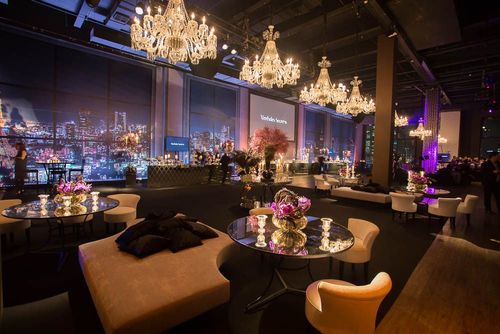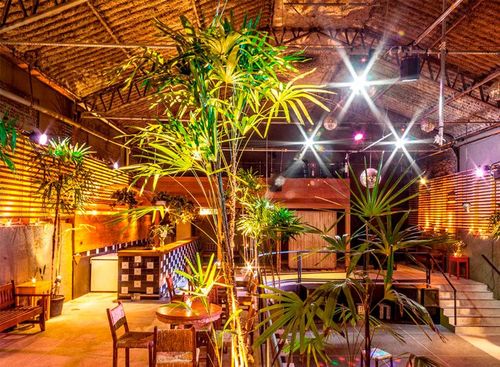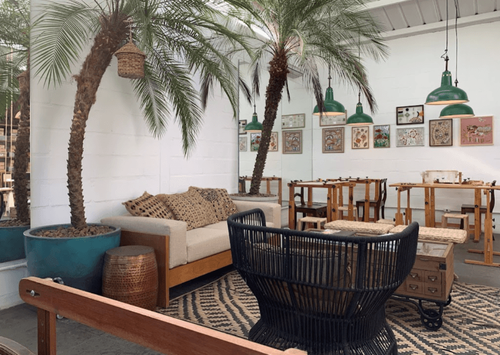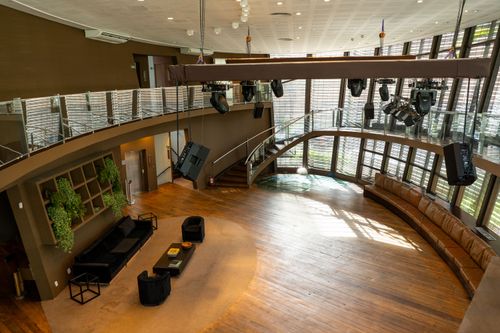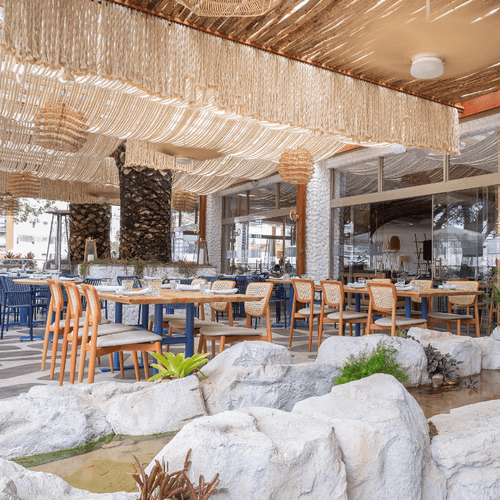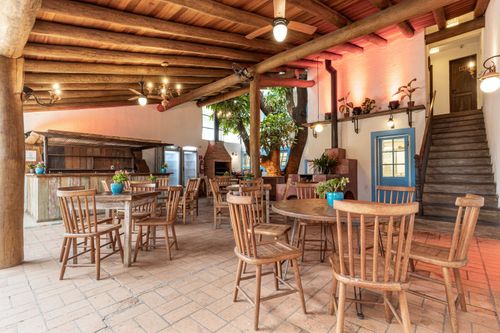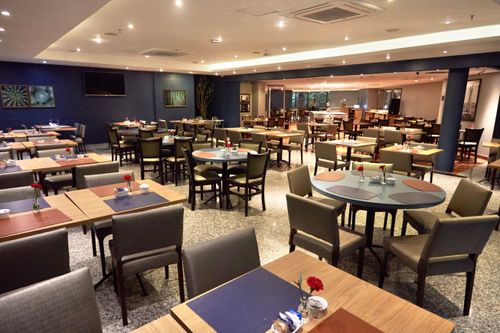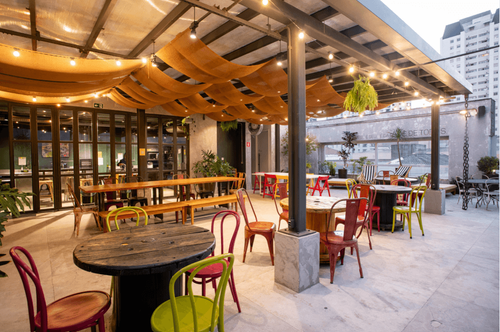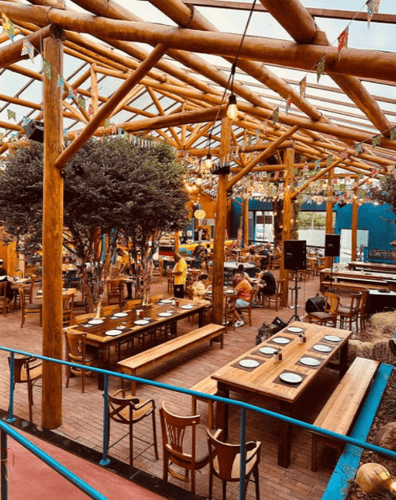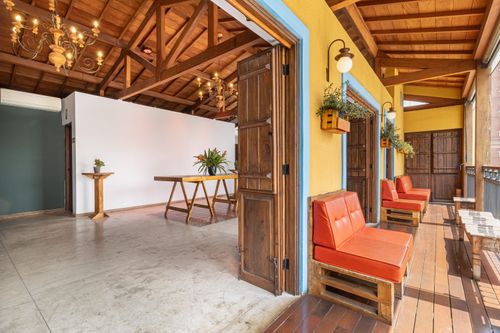Hire Afterwork Venues in São Paulo

Popular Afterwork Venues in São Paulo
Find unique afterwork spaces in São Paulo
See AllInnovative Industrial Venue With Stunning City Views for Corporate Events
Experience an extraordinary venue that seamlessly blends industrial design with modern elegance. This expansive event space features towering ceilings and a spacious layout, perfect for hosting a variety of corporate events. The architectural style combines... Show More
Playful Greenery-Filled Space with Rustic Charm for Memorable Gatherings
Step into a playful and cosy event space that seamlessly blends rustic aesthetics with vibrant greenery. This eco-friendly venue is designed to accommodate up to 350 guests, making it ideal for a variety of events, from after-work gatherings to anniversary... Show More
Bohemian-Inspired Urban Oasis for Creative Meetings and Workshops
Step into a captivating venue that beautifully blends modern architecture with tropical and Bohemian aesthetics. This space combines Scandinavian and Tropical Modernist design, where clean lines and minimalistic white walls are complemented by lush greenery... Show More
Luminous Reception Hall with Wooden Decor for High-End Events
Immerse yourself in a sophisticated event auditorium in São Paulo, designed to captivate every ray of sunlight and inspire creativity. With a main hall boasting an 8-meter high ceiling and expansive windows, this luminous space is perfect for high-end... Show More
Stunning Mykonos-Inspired Rooftop With Exquisite Aesthetics for Celebratory Dinners
Step into a venue where the festive spirit of Mykonos meets cutting-edge solar architecture. This rooftop gem boasts a design that harmoniously blends modern aesthetics with natural elements. At its heart is a breathtaking wooden structure adorned with 4,000... Show More
Intimate and Rustic Garden With Natural Vibe for Outdoor Events
Explore an intimate and eco-friendly gourmet garden venue in northwest Sao Paulo, ideal for hosting a variety of events including after-work gatherings, meetings, private dining, and cocktail parties. This venue combines colourful decor with a charming and... Show More
Bohemian Contemporary Dance Floor for Unforgettable Celebrations
Discover a dynamic event venue in the heart of Pinheiros, São Paulo, where bohemian charm meets contemporary style. Spanning 400 square metres with a striking 6-meter height, this adaptable space features a retractable roof, allowing for a flexible ambience... Show More
Elegant Modern Dining Space With Natural Ambience for Private Dinners
This venue exemplifies mid-century modern architecture, featuring open spaces, clean lines, and a welcoming atmosphere. The dining area is framed by floor-to-ceiling windows, offering stunning views of a lush garden and bathing the space in natural light... Show More
Vibrant Rooftop Space With Skylights for Networking and Workshops
Experience a unique blend of charm and modernity at this avant-garde rooftop venue in Sao Paulo's Pinheiros district. Ideal for corporate events, workshops, and networking sessions, this vibrant space is designed to inspire creativity and collaboration.Situate... Show More
Colourful Rustic Brazilian Dining Experience With Skylights
Step into a vibrant Brazilian restaurant in São Paulo, offering a unique dining experience amidst colourful decor and natural elements. This lively space features Brazilian murals, rustic wooden decor, and skylights that illuminate the space with natural... Show More
Colourful Balcony Venue with Warm Decor for Cocktail Parties
Explore a colourful and rustic event room with a balcony located in central São Paulo. This luminous and warm space is ideal for various events, including after-work gatherings, conferences, workshops, and cocktail parties. Its captivating ambiance and... Show More
A Guide to Hosting an Afterwork Event in São Paulo
São Paulo, the city that never sleeps, is a bustling metropolis where business and culture blend seamlessly. With its lively after-hours scene, this vibrant city is the perfect playground for hosting after-work events. Whether you’re looking for the best rooftop venues in São Paulo with breathtaking skyline views or cosy, hidden gems in the heart of the city, this Brazilian city offers an endless variety of venues to suit your style.
As the sun sets and the city lights start twinkling, São Paulo truly comes to life. It’s the perfect setting to unwind after a long day of meetings and deadlines, offering a mix of sophisticated spots and laid-back locales. The city’s diverse neighbourhoods, from the trendy streets of Vila Madalena to the upscale atmosphere of Jardins, provide an exciting backdrop for any after-work event. Plus, São Paulo’s culinary scene is world-class, so your guests will delight themselves in delicious Brazilian flavours and creative cocktails, such as the iconic caipirinha.
Bonus reading: To elevate your after-work event to the next level, incorporate these fun team-building activities in São Paulo.
Planning an after-work gathering here means you can tap into São Paulo’s electric energy while ensuring your event feels professional and relaxed. With easy access to public transport and a myriad of venues just a stone’s throw away from the office districts, hosting an event that’s convenient and enjoyable has never been easier. Keep reading as we guide you on how to host the best after-work event in São Paulo.
1) A Look at the Unique Types of After-Work Venues in São Paulo
São Paulo has no shortage of exciting venues to host an after-work event. Whether you're looking for a chic rooftop or something more unconventional, the city has a spot for every vibe. Here are five unique types of venues that genuinely capture the essence of São Paulo’s lively after-work scene.
- Rooftop Bars: Want a stunning view of the city skyline? Rooftop bars in São Paulo are perfect for impressing guests with panoramic views and a relaxed atmosphere. Enjoy cocktails and sunsets while the city buzzes below.
- Gastropubs: For a more casual yet trendy setting, São Paulo’s gastropubs offer a fusion of craft beers and gourmet food. These spots are ideal for mingling, indulging in local bites, and enjoying a laid-back evening with colleagues.
- Botecos: Experience São Paulo’s true cultural spirit at a boteco. These traditional Brazilian bars are known for their lively, no-fuss vibe, affordable drinks, and mouth-watering snacks like pastéis and coxinhas. They are great for a more informal and fun get-together.
- Art Galleries with Event Spaces: Mix culture with cocktails! Many art galleries in São Paulo double as event spaces, providing a creative backdrop for after-work gatherings. These venues are perfect if you want to add a bit of flair and sophistication to your event.
- Hidden Speakeasies: If mystery and exclusivity are what you're after, São Paulo’s hidden speakeasies are the way to go. Located behind unmarked doors or in unexpected locations, these venues create a memorable and unique experience for guests.
2) Discover the Best Areas in São Paulo for an After-Work Party
When it comes to after-work events, São Paulo's neighbourhoods each bring their own unique flavour. From trendy spots to more laid-back locales, there's an area to suit every mood. Here are five of the best neighbourhoods perfect for hosting your next after-work party.
- Vila Madalena: Famous for its artsy vibe and lively streets, Vila Madalena is a top choice for after-work drinks. With colourful murals, quirky bars, and buzzing nightlife, it’s ideal for a fun and creative gathering.
- Itaim Bibi: Known for its sleek, modern feel, Itaim Bibi is packed with upscale bars and restaurants. Perfect for a more sophisticated crowd, this area offers stylish venues just a short distance from many corporate offices.
- Pinheiros: This trendy neighbourhood has cool, laid-back bars and rooftop spots. Its mix of craft beer joints, chic lounges, and street food markets makes it perfect for a relaxed yet vibrant evening out.
- Jardins: Looking for something a bit more refined? Jardins is all about elegance, with its high-end restaurants and lounges. It’s the go-to area for hosting a polished after-work event with a touch of class.
- Centro: For a more urban experience, São Paulo’s city centre (Centro) offers a blend of historic charm and modern venues. It’s great for those who want to soak in the city’s energy while enjoying classic botecos and rooftop bars.
3) Budgeting in Style for After-Work Events
Planning an after-work event in São Paulo doesn't mean breaking the bank. Whether you're working with a modest budget or looking to splurge, the city offers plenty of stylish options. Here’s a breakdown of what you can expect to pay per hour for different types of venues.
- Basic Venues (€50–€100/hour): If you’re keeping it simple, basic venues like casual bars or community spaces are budget-friendly. They’re perfect for informal gatherings and offer great value without compromising on a fun atmosphere.
- Mid-Range Venues (€150–€300/hour): Mid-range venues, such as trendy gastropubs or rooftop bars, provide a balance between style and affordability. These spots are a bit more polished, making them ideal for events that need a touch of flair without overspending.
- High-End Venues (€500–€1,000+/hour): For a truly elevated experience, high-end venues such as upscale lounges or chic private spaces come with a higher price tag. These venues offer luxury, exclusivity, and premium service, perfect for impressing your guests in style.
Additional Costs to Consider:
- Catering
- Audiovisual Equipment
- Décor and Setup
- Service Charges and Taxes
- Entertainment
- Transportation
4) Enjoy These Local Delicacies at After-Work Events in São Paulo
No after-work event in São Paulo is complete without sampling the city’s delicious local flavours. Whether you’re hosting a casual gathering or a more formal affair, these tasty treats will keep your guests satisfied and coming back for more. Here are five local delicacies perfect for any after-work event.
- Coxinha: These crispy, fried dough balls stuffed with shredded chicken are a must-try. Easy to eat and always a crowd-pleaser, they’re great for casual snacking during drinks.
- Pão de Queijo: This cheesy bread is a Brazilian favourite. Light, fluffy, and addictive, it’s the perfect bite-sized treat to serve at any event, especially with a drink in hand.
- Pastel: Think of it as a Brazilian empanada! Pastéis are crispy pastry pockets filled with anything from meat to cheese, and they’re perfect for guests who want something warm and filling.
- Bolinho de Bacalhau: These fried codfish fritters are a classic Brazilian appetiser. Packed with flavour, they’re ideal for seafood lovers and pair wonderfully with a cold drink.
- Brigadeiro: For something sweet, you can’t go wrong with brigadeiros. These chocolate truffles made from condensed milk and cocoa are the perfect dessert to wrap up any event on a sweet note.
5) Maximise the Fun for Your After-Work Events in São Paulo
After-work events in São Paulo are all about mixing business with pleasure. To make sure your guests have a great time, adding some fun activities can elevate the experience. Here are five perfect after-work activities to keep the good vibes going.
- Live Music: Nothing sets the tone like live music. From samba bands to acoustic sets, São Paulo’s vibrant music scene can bring energy and excitement to any event and get everyone in a relaxed mood.
- Caipirinha-Making Classes: Why not let guests learn to mix Brazil’s famous cocktail? Caipirinha-making classes are a fun, interactive way to give everyone a taste of São Paulo’s signature drink while bonding over their creations.
- Karaoke: For something a bit more daring, karaoke always guarantees laughs. São Paulo has great karaoke spots where guests can belt out their favourite tunes and let loose after a long day.
- Interactive Food Stations: Set up food stations where guests can customise their dishes, like creating pastel or pão de queijo. It’s a great way to make dining part of the entertainment while showcasing local flavours.
- Samba Dance Lessons: Want to turn the energy up a notch? Hire a samba instructor to give a quick dance lesson. It’s a lively, engaging activity that will get everyone on their feet and enjoying the night.
Wrapping Up
We hope this guide has provided you with all the details necessary to begin organising an unforgettable after-work event in São Paulo. The city promises a fantastic experience; we’re sure you’ll have an amazing time. Have fun and make the most of it!

FAQs about São Paulo Afterwork Venues
Yes, hosting an after-work event in São Paulo is generally safe, but safety should be a priority. While the city offers vibrant venues and lively neighbourhoods, certain areas can experience higher crime rates. Choosing venues in safer districts like Itaim Bibi, Jardins, or Vila Madalena is essential, where security measures are typically in place. Additionally, ensure reliable transportation for your guests and remain vigilant throughout the event. Taking these precautions can help create a safe and enjoyable atmosphere for everyone.
São Paulo offers a variety of transportation options to get to your after-work venues. The city's extensive metro system is a quick and efficient way to navigate, with numerous lines connecting key areas. Buses and taxis are also widely available, while rideshare services like Uber and 99 are famous for their convenience and ease of use. If you're in a central location, you might even consider walking to nearby venues, as many are within walking distance of one another. Just be sure to plan your route ahead of time, especially during peak hours when traffic can be heavy.
After-work venues in São Paulo typically close between midnight and 2 AM, depending on the type of establishment and its location. Bars and casual eateries often serve until around midnight, while nightclubs and some upscale lounges may remain open until 2 AM or later, especially on weekends. It's a good idea to check the specific closing hours of your chosen venue in advance, as some places may have different hours or special events that affect their schedule.
To manage language barriers and ensure smooth communication with local vendors and guests in São Paulo, consider hiring a bilingual event coordinator or translator who can facilitate discussions and help bridge any gaps. Providing written materials, such as invitations and menus, in both English and Portuguese can also enhance understanding. Encouraging guests to learn a few basic Portuguese phrases can foster a friendly atmosphere. Additionally, many vendors in São Paulo are accustomed to working with international clients, so don’t hesitate to ask if they have English-speaking staff available. Communication can be seamless and enjoyable for everyone involved with some planning.
